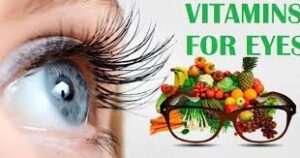Eyes, the windows to the world, deserve the best care to maintain clear vision and overall health. One of the key components in this endeavor is ensuring a diet rich in vitamins that specifically promote eye health. In this article, we’ll explore the vital vitamins that serve as nutrients for your eyes, helping you see clearly and protect against potential vision issues.
Body:
- Vitamin A – The Guardian of Night Vision: Known for its crucial role in maintaining healthy vision, Vitamin A plays a vital part in the functioning of the retina. It is essential for low-light and color vision, helping prevent night blindness and contributing to the overall health of your eyes. Foods rich in Vitamin A include sweet potatoes, carrots, and leafy greens.
- Vitamin C – Antioxidant Powerhouse for Eye Tissues: Vitamin C, a potent antioxidant, supports the health of blood vessels in the eyes and reduces the risk of cataracts. Citrus fruits, strawberries, and bell peppers are excellent sources of Vitamin C that contribute to maintaining the integrity of eye tissues.
- Vitamin E – Shielding Against Age-Related Macular Degeneration: As a powerful antioxidant, Vitamin E helps protect cells from damage caused by free radicals. It has been linked to a lower risk of age-related macular degeneration (AMD), a condition affecting the central part of the retina. Nuts, seeds, and spinach are great sources of Vitamin E.
- Zinc – Essential for Retinal Health: Zinc is a mineral that plays a vital role in maintaining the health of the retina and may help prevent macular degeneration. Incorporating zinc-rich foods such as oysters, beef, and lentils into your diet supports the overall well-being of your eyes.
- Omega-3 Fatty Acids – Nourishing Retinal Cells: Essential fatty acids, particularly omega-3s, are integral for the health of retinal cells. Fatty fish like salmon, flaxseeds, and walnuts are excellent sources of these fatty acids, contributing to optimal eye function and reducing the risk of dry eyes.
- Lutein and Zeaxanthin – Shielding Against Harmful Light: These carotenoids are crucial for protecting the eyes against harmful high-energy light waves like ultraviolet rays. Leafy greens, broccoli, and eggs are rich in lutein and zeaxanthin, promoting visual acuity and reducing the risk of age-related vision issues.
Incorporating a variety of nutrient-dense foods into your diet that are rich in these eye-friendly vitamins is a proactive step towards maintaining optimal vision. By nourishing your eyes with Vitamin A, C, E, zinc, and omega-3 fatty acids, you’re not only supporting their health but also taking a significant stride towards preventing potential eye issues. Let your plate be a palette of colors, providing the essential vitamins your eyes need to see the world with clarity and vibrancy.

Vibrant Vision: The Visual Benefits of Embracing Vegetables
In the pursuit of optimal eye health, the saying “eat your greens” takes on a whole new meaning. Vegetables, rich in essential nutrients and antioxidants, play a pivotal role in supporting and maintaining the health of our eyes. In this article, we’ll delve into the multitude of reasons why incorporating vegetables into your diet is a visionary choice.
- Leafy Greens – A Kaleidoscope of Nutrients: Leafy greens such as spinach, kale, and collard greens are veritable powerhouses of nutrients, including lutein and zeaxanthin. These antioxidants are known to protect the eyes from harmful high-energy light waves, reducing the risk of age-related macular degeneration and promoting visual acuity.
- Carrots – Beta-Carotene Boost for Clear Vision: Carrots, often associated with good eye health, are rich in beta-carotene – a precursor to Vitamin A. This essential nutrient is crucial for maintaining healthy vision, preventing night blindness, and supporting overall eye function.
- Broccoli – Sulforaphane’s Shield Against Oxidative Stress: Broccoli contains sulforaphane, a potent antioxidant that helps protect the eyes against oxidative stress. Regular consumption may contribute to preventing age-related vision issues and promoting the health of ocular tissues.
- Bell Peppers – A Colorful Source of Vitamin C: Bell peppers, with their vibrant colors, are excellent sources of Vitamin C – a key antioxidant that supports blood vessels in the eyes. Including bell peppers in your diet can help reduce the risk of cataracts and maintain the integrity of eye tissues.
- Sweet Potatoes – Vitamin A for Low-Light Vision: Sweet potatoes are rich in Vitamin A, essential for low-light and color vision. Incorporating these delicious tubers into your meals can contribute to preventing night blindness and supporting overall eye health.
- Zucchini – Hydration for Ocular Comfort: Zucchini, with its high water content, aids in keeping the eyes hydrated. Proper hydration is crucial for maintaining tear production, preventing dry eyes, and ensuring overall ocular comfort.
The connection between vegetables and good eye health is undeniable. By embracing a colorful array of leafy greens, vibrant bell peppers, and nutrient-rich veggies, you provide your eyes with the essential vitamins and antioxidants they need to thrive. Make vegetables a cornerstone of your dietary choices, and you’ll not only savor the flavors but also gift your eyes the care they deserve. A plate full of vegetables is not just a meal – it’s a visual feast that nourishes and protects, ensuring your eyes see the world in all its vivid glory.

Elevate Your Vision: Exploring Functional Food Supplements for Optimal Eye Health
In the dynamic landscape of health and wellness, the role of functional food supplements has garnered increasing attention. When it comes to caring for our eyes, incorporating targeted supplements into our diet can be a strategic and proactive approach. This article dives into the world of functional food supplements, highlighting their potential benefits in promoting and maintaining optimal eye health.
Body:
- Omega-3 Fatty Acids – The Eye’s Nutrient Hero: Omega-3 fatty acids, commonly found in fish oil supplements, play a crucial role in supporting retinal health. These essential fatty acids contribute to the prevention of dry eyes, support overall eye function, and may reduce the risk of age-related macular degeneration (AMD).
- Lutein and Zeaxanthin – Visionary Carotenoids: Supplementing with lutein and zeaxanthin, powerful carotenoids naturally found in the eyes, can enhance visual acuity and protect against harmful light waves. These supplements may aid in reducing the risk of conditions such as cataracts and AMD.
- Vitamin A – A Visionary Antioxidant: Vitamin A supplements are beneficial for maintaining healthy vision, particularly in low-light conditions. These supplements contribute to preventing night blindness and supporting the integrity of the eye’s surface tissues.
- Vitamin C – Collagen Boost for Ocular Resilience: Vitamin C supplements support collagen production, essential for the health of blood vessels in the eyes. By promoting vascular integrity, these supplements contribute to reducing the risk of cataracts and supporting overall ocular health.
- Vitamin E – Cellular Defense Against Oxidative Stress: Vitamin E supplements act as antioxidants, safeguarding cells from oxidative stress. This protection is vital for preventing age-related vision issues and supporting the overall well-being of ocular tissues.
- Zinc – Essential Mineral for Retinal Health: Zinc supplements play a crucial role in maintaining the health of the retina and may contribute to preventing macular degeneration. These supplements are particularly beneficial for individuals with a zinc deficiency.
- Bilberry Extract – Nature’s Vision Booster: Bilberry extract supplements, rich in anthocyanins and antioxidants, have been associated with improved night vision and enhanced blood circulation to the eyes. These supplements may support overall visual acuity.
Functional food supplements tailored for eye health can be valuable additions to your wellness routine. As with any supplement regimen, it’s advisable to consult with a healthcare professional to determine individual needs and dosage. By embracing these functional supplements, you are taking a proactive step toward preserving and enhancing the health of your eyes, ensuring that they remain windows to a vibrant and clear world.
